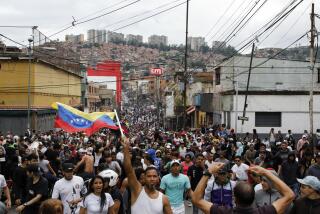Views Differ on Strike Turnout in a Split Venezuela
CARACAS, Venezuela — A strike closed businesses, health clinics and schools throughout Venezuela on Monday, but participation was not as widespread as in previous such protests.
Opposition figures claimed they had shut down 80% of the country, from banks to bus lines to bakeries. They said they would continue the strike today in order to force President Hugo Chavez to hold a vote on his rule.
The promise immediately raised fears that the protest would turn violent. The last prolonged strike, in April, resulted in a coup against Chavez, who was restored to power two days later.
“The strike has been a total success,” said Manuel Cova, secretary-general of the country’s largest union, the Confederation of Venezuelan Workers. “The people have roundly rejected the government of Hugo Chavez and have asked for an electoral solution to this crisis.”
Officials loyal to Chavez claimed just the opposite, saying that 80% of the nation continued to function. They condemned the protest as a thinly veiled attempt to spark a second coup against Chavez. The government said the petroleum sector -- which accounts for half the nation’s revenue and is the third-largest supplier of oil to the U.S. -- was functioning “basically normally.”
“The strike has been a complete failure,” said Luis Alfonso Davila, a director in Chavez’s political party, the Fifth Republic Movement.
The truth seemed to lie somewhere in between. A tour of Caracas, the capital, clearly showed that many stores were closed and that the streets had far less traffic than normal. But just as clear was the difference from a one-day stoppage in October, during which the opposition claimed 90% participation. On Monday, more businesses opened, more shoppers hit the streets, and more cars cruised the highways.
At least part of the reason was timing. These protests come in December, when workers with Christmas bonuses do their holiday shopping and merchants enjoy their strongest sales.
During the last strike, Jose Birouti shut down his tiny hardware store on one of Caracas’ main boulevards. But he was open Monday, although he said he opposes Chavez.
“I’ve got to pay the rent,” Birouti said as trucks roared past. “I’d be closed, if not for the expenses that I have to pay.”
Another reason was the nature of the strike. Opposition figures have refused to say how long it would last, leading some people to do emergency shopping in case the closures are prolonged.
But perhaps the biggest reason for the lower participation was fatigue. After more than a year of nearly continuous conflict between Chavez and a scattered opposition that includes businesses, unions, the Roman Catholic church and the media, Venezuelans have little to show but a deeply riven nation.
Both sides have pledged to continue negotiations mediated by Cesar Gaviria, secretary-general of the Organization of American States. The talks, which have produced few concrete results so far, remained suspended Monday.
The government has said it will not negotiate during the strike. Opponents say the goal of the work stoppage is to persuade the government to return to the table to discuss a proposed referendum on Chavez’s rule to be held in February. Chavez has said a referendum is prohibited until August.
The government and opposition figures spent the entire day in a surreal battle on the nation’s airwaves. Private media outlets showed images of abandoned streets and closed shops. The state-run television ran a continuous tape of a street in downtown Caracas packed with thousands of shoppers.
The army and Chavez allies in local government sponsored a daylong street market on one of the city’s major thoroughfares, which filled with tens of thousands of shoppers who ignored the call to strike. Doctors and dentists attended lines of patients that snaked for blocks. Government-backed banks in street tents handed out micro-credit loans. Veterinarians provided free rabies shots. Commercial vendors sold food subsidized by the government at prices up to 60% below normal: Four pounds of melon for 75 cents. Two pounds of tomatoes for 70 cents. Soldiers even distributed free ingredients for hayaca, a tamale-like Christmas treat.
Army officials insisted that it was simply coincidence that the public relations bonanza occurred the same day as the anti-government strike, saying the market was a previously planned part of Chavez’s commitment to the poor.
“We’re here because we got orders to be here. It has nothing to do with politics,” said Sgt. Javier Guevara, who was overseeing a battalion providing free haircuts to passersby.
A few hundred yards away, Hiliberto Rodriguez was selling posters of Chavez and Che Guevara, the Cuban revolutionary. Chavez, he said, was outselling Che.
More to Read
Sign up for Essential California
The most important California stories and recommendations in your inbox every morning.
You may occasionally receive promotional content from the Los Angeles Times.










